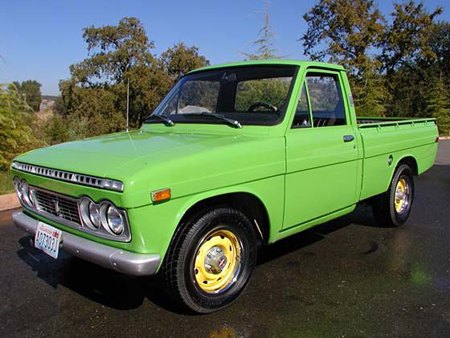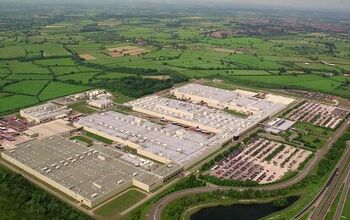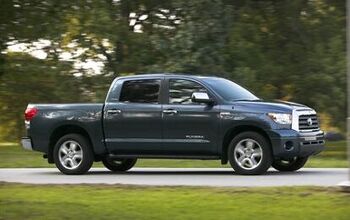Toyota: [Falling] Quality is Job One
Play word association with the average American consumer. Say the words “quality cars.” Chances are they’ll respond with “Toyota.” For decades, the Japanese automaker has carefully nurtured and perpetuated a reputation for producing well-built/reliable cars and trucks. As a result, the company’s US sales have grown like kudzu. As of last month, Toyota now sells more cars in the Americas than Ford. If you discount fleet sales (so to speak), Toyota’s totals are within shouting distance of GM’s, both nationally and worldwide. Despite this startling, seemingly unstoppable success, or perhaps because of it, the company’s supposedly impenetrable façade has begun to show a few cracks.
Toyota’s first foray into US manufacturing began with a 25% federal tariff on foreign pickups. Toyota reacted to the punitive tax by importing bare chassis and attaching the truck beds in an American facility. When The Big Three (who were about to introduce their first domestic small trucks) pressured Congress into widening the tariff to include imported chassis, Toyota built an American plant to assemble complete trucks. Once the Japanese manufacturer realized they could build competitive vehicles stateside, they began expanding their American operations.
To avoid the United Auto Workers (UAW), Toyota situated their new factories in “right to work” states. As many industry analysts have concluded, Toyota’s clean sheet factories (eventually aided by state-funded tax breaks) and non-union workforce gave them an immediate and unassailable advantage over their “domestic” competition. While GM, Ford and Chrysler were busy appeasing their unions, draining funds which could have been used to upgrade their ageing products and antiquated production facilities, Toyota hit the ground running and never looked back.
At some point, Toyota became a victim of its own success. The company’s double quick expansion, from perennial underdog to voracious overlord, has compromised their unique selling point: product quality. Specifically, Toyota has suffered a plague of recalls around the world. In 2003, the automaker recalled 200k American vehicles. In 2004, the number increased fivefold, to a little over one million vehicles. In the following year, the number leaped again, more than doubling to 2.2 million. So far this year, Toyota has announced five recalls affecting approximately 900K vehicles.
Again, Toyota’s rapid growth is to blame. For one thing, the company’s design centers have been understaffed. The shortage of in-house talent has forced Toyota to outsource, relying on its parts suppliers to design key components. At the same time, the automaker has increased the amount of parts sharing among different models. The practice has dramatically increased the scope of a "single" failure, as witnessed by last October's recall of 1.27m Japanese vehicles. Goldman Sachs estimates that design faults (e.g. rubber parts not thick enough to withstand engine heat and joints too weak to hold together) account for 68% of Toyota’s 2004 recalls.
Andrew Phillips of Nikko Citigroup stated "Toyota's resources have been stretched quite a bit by the big increases in volume." Shinsei Securities analyst Yasuhiro Matsumoto lays the blame for Toyota’s declining quality squarely on Katsuaki Watanabe’s shoulders. He claims the CEO’s constant focus on cost cutting has created devastating production glitches. The resulting quality issues have become so alarming that Watanabe recently admitted, "I take this seriously and see it as a crisis." It’s just as well; Goldman Sachs analyst Kunihiko Shiohara estimates that it may take Toyota four years or more to achieve "a fundamental turnaround in quality levels.”
Toyota also seems to be off their game in predicting market shifts. True, the company displayed impeccable timing by importing the Yaris just as American demand for smaller, higher mileage cars kicked into high gear. But Toyota’s also about to begin production on a larger, heavier and more powerful full-size Tundra, assembled in a brand new $800m Texas plant. While Toyota sells the high mileage cars tree huggers love to hug, they also have the thirstiest truck fleet on the market. And now that large truck sales seem to be tanking, they’re gearing-up to produce them in record numbers. Only time will tell if they’ve made a smart move (i.e. if sales recover or GM goes bankrupt), but at this point their timing could hardly be worse.
Earlier this year, Toyota announced they were delaying the introduction of the new Corolla for a year to focus on the launch of the new Camry. This will leave the current generation Corolla in service for a Big Three-like six years. While the move could reflect a redoubling of Toyota’s commitment to quality, it gives the model’s competitors some much-needed breathing room. Is this a minor setback in Toyota’s relentless march on American market share or warning signs of a more fundamental, less easily solved problem? It’s too early to tell. But stay tuned. We’re on it.
More by Frank Williams
Latest Car Reviews
Read moreLatest Product Reviews
Read moreRecent Comments
- SCE to AUX Competition for the 2027 Rivian R3, but 2 years early.
- Akear GM shock will skyrocket when Barra retires.
- Mike Bradley Driveways, parking lots, side streets, railroad beds, etc., etc., etc. And, yes, it's not just EVs. Wait until tractor-trailers, big trucks, farm equipment, go electric.
- Cprescott Remember the days when German automakers built reliable cars? Now you'd be lucky to get 40k miles out of them before the gremlins had babies.
- Cprescott Likely a cave for Witch Barra and her minions.


































Comments
Join the conversation
A lot of talk about JD Power surveys. Remember they only survey initial quality. It is the durability of the product that consumers are concerned about. My son just bought a 07 Tacoma after two terrible big 3 products. Paid more money up front but should be less overall after the thousands he spent on the last two.
The experiences of your sainted aunt Tessie are nice, but that is just one or two cars. It's like going to a baseball game and seeing Manny Ramirez strike out 4 times. Does that mean Manny is a poor hitter? I don't think so. The fleet wide numbers are out there. Toyota and Honda quality and reliability are vastly superior to everything else, including other Japanese makers. It isn't even close. American manufacturers realize that advertising and sponsoring surveys is far cheaper than trying to match Toyota and Honda quality so they just lie. The fact that the head of Toyota comes out and says they have a quality crises should be a big fat clue as to what they are about. Any chance that the head of Ford would do any such thing? Nah. Look at what Ford has done over the years when they had quality problems that seriously impacted vehicle safety. Pinto gas tanks. Ford pickup gas tanks. Transmissing dropping out of park into reverse (yes I got one of those infamous stickers, and I actually had to chase down a Ford on foot with a screaming wife in it.) Explorers flipping over on the highway. Ford's game is denial until served in a court of law. I will NEVER buy a car made by an American manufacturer again. You are putting your loved ones in these cars. Your family needs you to arrive home safely each day. Think about it.